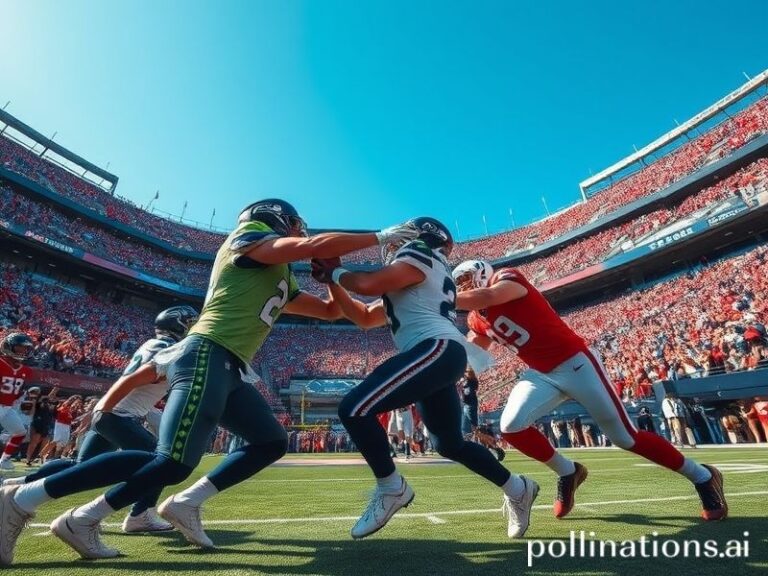Liverpool vs Southampton: How a Provincial Kick-About Became the World’s Favorite Distraction
Liverpool vs Southampton: A Micro-Drama for a Macro-Mess
By our man in the cheap seats, wondering if the apocalypse has VAR
The planet is busy imploding—ice shelves calving like bored royals, shipping lanes turning into jacuzzis, and democracy being auctioned off between smartphone notifications—yet for ninety-odd minutes on a damp English Saturday, a reasonable slice of humanity will redirect its existential dread toward a rectangle of grass where millionaires in neon boots negotiate the fate of a ball that costs more than a Moldovan village school. Liverpool versus Southampton: a fixture that sounds less like a football match and more like an away-day for maritime pirates, but which, in the grand bazaar of global spectacle, still shifts satellite subscriptions from Lagos to Laos.
Why should anyone outside the Mersey or the Solent care? Because the Premier League is Britain’s last reliable export, the emotional equivalent of those container ships queueing outside Felixstowe—except the cargo is hope, and the customs officials are hedge-fund managers in London docklands who long ago offshored their souls to Jersey. Every time Mohamed Salah pirouettes past a hapless full-back, GIFs ricochet across WhatsApp groups in Jakarta sweatshops and Cairo cafés, offering a four-second vacation from wage stagnation and the price of onions. Meanwhile, in the away end, 3,000 Saints fans bellow about being the “Pride of the South Coast,” a coastline that may be underwater by the time their grandchildren can afford a season ticket—assuming the club hasn’t been relocated to a branded fan-zone in Riyadh.
International investors certainly care. Liverpool’s owners, the same consortium that once tried to copyright the word “Liverpool,” have been busy turning triumph into leverage, the modern alchemy of converting trophies into collateral. Southampton, meanwhile, are the footballing equivalent of a clearance rack: buy low, polish with sports-science jargon, sell high to a Champions-League side, repeat until morale improves or the accountant buys a yacht. The match therefore doubles as a live auction: one eye on the scoreboard, the other on the scouting app. Somewhere in a glass box, a Danish data-analyst is having his quarterly bonus determined by whether a 19-year-old right-back can survive Salah without tearing a hamstring or his own self-esteem.
The geopolitical subplot is tastier than the stadium pies. Both clubs flirt with US venture capital, Emirato-Qatari sponsorship tiers and Chinese betting platforms—an orgy of soft power so intricate it makes the old East-West proxy wars look refreshingly straightforward. Every pass, then, is a tiny referendum on which petro-state gets cultural cachet this week. If that sounds cynical, remember the match programme now contains more banking partners than substitute names, and the halftime entertainment is brought to you by a crypto exchange that vanished from the internet the following Tuesday.
Yet the real miracle is that people still watch, hope, swear—rituals older than the advertising dashboards tracking their heart rates. In a world where governments outsource compassion to NGOs and NGOs outsource it to influencers, the stands remain one of the few places where adults cry in public without needing to post about it. The final whistle will change nothing: Liverpool will still chase Manchester City like Icarus with a GPS, Southampton will continue their annual limbo between relegation and respectability, and the Arctic will lose another Slovenia-sized chunk of ice. But for the duration, the illusion persists that outcomes are meritocratic and that 22 humans and a sphere can still write a better narrative than the algorithm.
Full-time approaches. Somewhere in Senegal a fisherman checks the score on a cracked screen; in São Paulo a bar erupts as Alisson saves a point-blank header; in Kent a hedge-fund intern sells his Southampton shares because the xG models look soggy. The planet spins, the oceans rise, the commentators promise “massive implications for the top-four race,” which is code for “please ignore the bigger race we’re all losing.” But hey—at least the highlights will be free on YouTube, right until the copyright bots arrive, like bailiffs at a street party.
And that, dear reader, is the most honest scoreline of all: Humanity 0, Late Capitalism 1, match abandoned due to rising sea levels.







